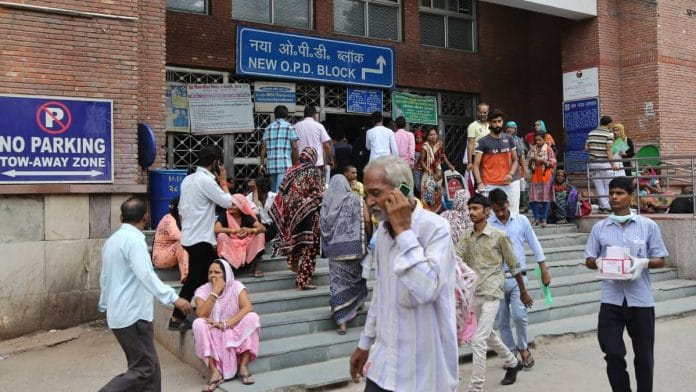New Delhi: Since its inception in 2018, more than 18,000 fraudulent hospital transactions have been detected in the insurance arm of Ayushman Bharat, the flagship health programme of the National Democratic Alliance (NDA) government. The insurance scheme, Pradhan Mantri Jan Arogya Yojana (PMJAY), provides health coverage of Rs 5 lakh per annum to eligible families.
In a written reply in the Rajya Sabha, Dr Bharati Pravin Pawar, minister of state for health and family welfare, said, “Suitable penal action in terms of anti-fraud guidelines was taken against hospitals in respect of non-genuine 18,606 hospital transactions. Penalty amounting to Rs 29.72 crore was levied on erring hospitals. Further, 144 hospitals are de-empanelled from the scheme based on confirmed fraudulent behaviour.”
PMJAY operates as a public-private partnership where cardholders can get treatment at any empanelled hospital, government or private. Procedures covered by the scheme have rates fixed in advance. Beneficiaries don’t have to make any payments up front, and when claims are raised, hospitals are reimbursed the entire amount, provided this doesn’t exceed the prescribed rates.
The total target population of PMJAY is about 50 crore people, to be identified using data from the 2011 Socio Economic and Caste Census. Beneficiaries are covered for 1,500 treatment packages.
‘Zero tolerance’ for corruption
In her reply to the question by Trinamool Congress MP Jawhar Sircar, Dr Pawar also said that the Ayushman Bharat–Pradhan Mantri Jan Arogya Yojana (AB-PMJAY) is governed on a zero-tolerance approach to any kind of fraud.
Among practices deemed fraudulent under the scheme are suspect or non-genuine medical treatment claims, impersonation, and upcoding of treatment packages or procedures. (Upcoding is when a healthcare provider submits insurance claims for more serious and expensive procedures than were actually performed.)
Dr Pawar said, “National Health Authority — the implementing agency of AB-PMJAY — has issued a comprehensive set of anti-fraud guidelines. Anti-fraud advisories are issued to states/ UTs. National Anti-Fraud Unit (NAFU) is created at NHA for overall monitoring and implementation of anti-fraud framework supported by State Anti-Fraud Units (SAFUs) at state level.”
She added, “All claims require mandatory supporting documents along-with on-bed patient photo before approval and payment. The feature of Aadhaar-based biometric verification of [the] beneficiary at the time of admission and discharge is launched at all private hospitals. Use of artificial intelligence and machine learning is made for a comprehensive fraud analytics solution to detect fraud proactively, develop algorithms that can be used on [a] large volume of data to identify suspect transactions and entities, and risk scoring of hospitals and claims.”
Also read: No income bar, free OPD — why Odisha says its health insurance scheme trumps Ayushman Bharat






